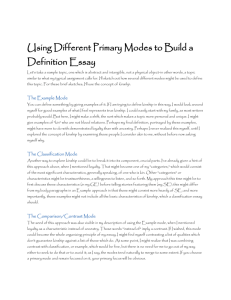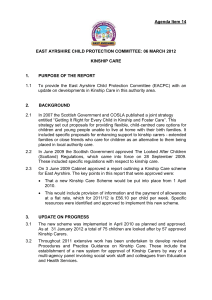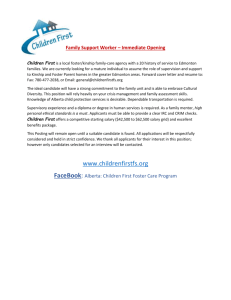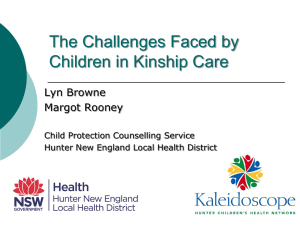The Reality of Kinship Care - Idaho Grandparents As Parents
advertisement
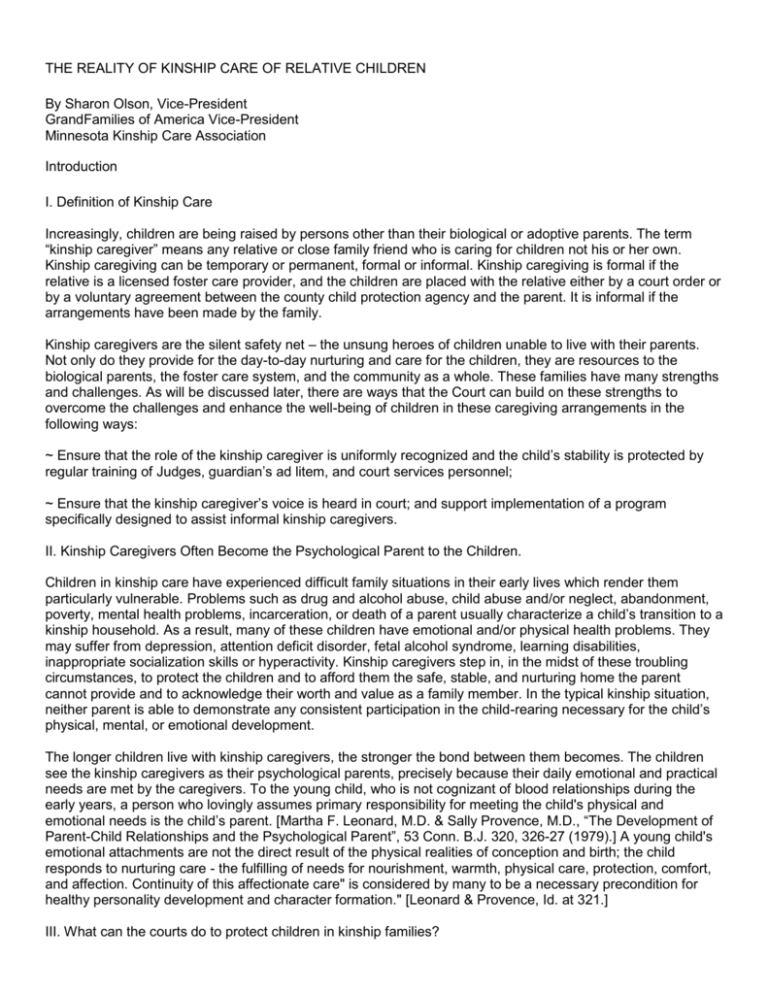
THE REALITY OF KINSHIP CARE OF RELATIVE CHILDREN By Sharon Olson, Vice-President GrandFamilies of America Vice-President Minnesota Kinship Care Association Introduction I. Definition of Kinship Care Increasingly, children are being raised by persons other than their biological or adoptive parents. The term “kinship caregiver” means any relative or close family friend who is caring for children not his or her own. Kinship caregiving can be temporary or permanent, formal or informal. Kinship caregiving is formal if the relative is a licensed foster care provider, and the children are placed with the relative either by a court order or by a voluntary agreement between the county child protection agency and the parent. It is informal if the arrangements have been made by the family. Kinship caregivers are the silent safety net – the unsung heroes of children unable to live with their parents. Not only do they provide for the day-to-day nurturing and care for the children, they are resources to the biological parents, the foster care system, and the community as a whole. These families have many strengths and challenges. As will be discussed later, there are ways that the Court can build on these strengths to overcome the challenges and enhance the well-being of children in these caregiving arrangements in the following ways: ~ Ensure that the role of the kinship caregiver is uniformly recognized and the child’s stability is protected by regular training of Judges, guardian’s ad litem, and court services personnel; ~ Ensure that the kinship caregiver’s voice is heard in court; and support implementation of a program specifically designed to assist informal kinship caregivers. II. Kinship Caregivers Often Become the Psychological Parent to the Children. Children in kinship care have experienced difficult family situations in their early lives which render them particularly vulnerable. Problems such as drug and alcohol abuse, child abuse and/or neglect, abandonment, poverty, mental health problems, incarceration, or death of a parent usually characterize a child’s transition to a kinship household. As a result, many of these children have emotional and/or physical health problems. They may suffer from depression, attention deficit disorder, fetal alcohol syndrome, learning disabilities, inappropriate socialization skills or hyperactivity. Kinship caregivers step in, in the midst of these troubling circumstances, to protect the children and to afford them the safe, stable, and nurturing home the parent cannot provide and to acknowledge their worth and value as a family member. In the typical kinship situation, neither parent is able to demonstrate any consistent participation in the child-rearing necessary for the child’s physical, mental, or emotional development. The longer children live with kinship caregivers, the stronger the bond between them becomes. The children see the kinship caregivers as their psychological parents, precisely because their daily emotional and practical needs are met by the caregivers. To the young child, who is not cognizant of blood relationships during the early years, a person who lovingly assumes primary responsibility for meeting the child's physical and emotional needs is the child’s parent. [Martha F. Leonard, M.D. & Sally Provence, M.D., “The Development of Parent-Child Relationships and the Psychological Parent”, 53 Conn. B.J. 320, 326-27 (1979).] A young child's emotional attachments are not the direct result of the physical realities of conception and birth; the child responds to nurturing care - the fulfilling of needs for nourishment, warmth, physical care, protection, comfort, and affection. Continuity of this affectionate care" is considered by many to be a necessary precondition for healthy personality development and character formation." [Leonard & Provence, Id. at 321.] III. What can the courts do to protect children in kinship families? Ensure that the role of the kinship caregiver is uniformly recognized and the child’s stability is protected by regular training of judges, guardian’s ad litem, and court services personnel. Kinship caregivers and their advocates report that the courts, guardians ad litem, and county staff do not uniformly recognize the positive role the kinship caregivers play in the lives of the children in their care and in fact can be hostile and ultimately detrimental to the fragile family constellation. Courts, guardians ad litem, and custody evaluators appointed by the court should receive training on these kinship issues. It is important that cultural diversity be recognized and training on cultural practices and traditions within families be evaluated by providers. First, formal recognition should be made that the definition of family has changed from the traditional mother, father, child to include extended, kinship families that provide for the safety and security of the children. Second, the court and guardians ad litem should recognize that the whole concept of permanency is different in kinship care than in disputes between two parents for custody, as in divorce situations. In kinship care, permanency is based not so much on the relationship with the primary parent per se, rather it is an expression of a child’s rootedness in a relationship with a given caregiver who is part of that child’s family, in a stable place, with a stable constellation of family members who care for and support the child. This relationship usually develops because the parent is not parenting the child. Courts and guardians ad litem must pay attention to and be aware of the actual family constellation and what role the biological parents are playing. Often, parents come in and out of the children’s life just enough to be “present” as far as a court, guardian ad litem, or social worker is concerned, and thus enough to cause considerable disruption and confusion in the child’s life. Such behavior should be scrutinized for what it is and the effect it has on the child (and the caregiver). The needs of kinship families are complex and thus the courts and guardians ad litem need training on the issues facing these families so that in every case, a solution in the best interests of the child is met. Finally, stories told throughout the state point to a disparity in training of guardians ad litem. Some seem to have personal anti-kinship care views that supersede the tenet of the best interest of the child. We hear stories of guardians ad litem who never visit the grandparent’s home, see the child only once, and/or do not listen to the facts the grandparents try to share. We also hear that they are not always timely appointed and that this is harmful to the process. A. Ensure that the kinship caregiver’s voice is heard in court Grandparents and relatives report that they do not have a say most times once child protection gets involved and/or the child’s case goes to court. The extended families deal with fragmented and often incorrect information grasped from whatever means available when custody issues surface. Too often relatives are left out of the process and learn about the proceedings after the fact. Further, kinship caregivers do not know their rights as far as court proceedings are concerned and when and how they can become involved. They often feel things happen behind their backs. It seems to them that the advice, information, and procedures are not uniform even from one hearing to the next in the same court. Often they plan, prepare, and are ready to make a statement in court, but are not allowed or not informed as to how to state their case. They may attend a court hearing and not understand what just happened or what exactly their role is with the children in their care, even after an order has been issued. Often it is the grandparents who really know what is going on in the children’s lives and if the court does not avail itself of this very pertinent information, the children are put at risk. Many times the child has extended family concerned with his/her welfare. Courts can ensure that the kinship caregiver’s voice is heard by giving the caregiver the opportunity to present information in court and by ensuring that the guardian ad litem has done his or her job properly. Family group conferencing with a trained facilitator would bring those interested in the welfare of the child together for consensus on the placement of the child. The court can be an intimidating place and seems to be such for those are unfamiliar with it. Thus some caregivers even when possessing information about the child, will be silent and shy in the presence of the professionals in the court. A court appointed advocate for these caregivers could ease and eliminate these concerns by merely providing information and acting as a guide. B. Support implementation of a program specifically designed to assist informal kinship caregivers. Given that the vast majority of children living outside of their parents’ home are in the informal system, it makes great sense to develop some program geared towards nurturing those caregivers – to keep children safe and out of the foster care system. As it is now, the system uses a "back-end" vs. "front-end" approach in funding programs to support children of abuse and neglect. The majority of federal funding, "back-end" or Title lV-E, can only be accessed after a child has been removed from their parents. The "front-end" approach would be a program that supports and strengthens the already-existing safety net for children – the informal kinship caregiver and will serve to prevent children from entering the formal system. According to the Pilot Study on Informal Kinship Care in Minnesota by Priscilla Gibson. Ph.D. and Terry Lum, Ph. D. University of Minnesota School of Social Work, College of Human Ecology, the most frequent service needed by the caregivers is financial assistance followed by a need for support from social service agencies and services for grandchildren’s mental and physical health. This program should support the children in the homes in which they are living and at a minimum be available uniformly in every county to informal caregivers in a less intrusive, and more child-friendly way than what the system now offers; It should guide the grandparents and relatives who wish to provide a home for the children through the complicated legal snarls they encounter (including providing necessary legal documents); It should provide information and assistance to access benefits; For instance, all "child only" TANF cases could be assigned to a specific worker (through a navigator program). Grandparents would be advised of all of the benefits to which they and the children in their care are entitled: e.g., child support, SSI, waived services etc., and would assist them to access those benefits if necessary. An example would be to have a designated kinship worker to guide kinship families to services available to them. It should also access to legal services for relatives who are raising kin; and provide ongoing support services to the caregivers and the children, which should reflect the complex demands of the older kinship caregiver role. IV. Conclusion According to a recent PEW Commission report, (attached) informal kinship caregivers are the "unseen" partnership of the nation's courts. The informal kinship caregiving system works because the relatives continue to step up to the plate to meet the needs of the children. This informal system has no bureaucracy, few statutes and only a handful of attorneys, and kinship caregivers continually find themselves at odds with (and not supported by) the system set up to help children – the foster care system. They see themselves, as the “square peg in the round hole” as they try to fit into the rules of the system – be it the social service system or the courts. Nationwide, the foster care system cares for 500,000 children, the other for almost 6 million. Any action this court can take to acknowledge and support kinship caregivers and the children in their care will improve the lives of countless children and caregivers and strengthen families.


